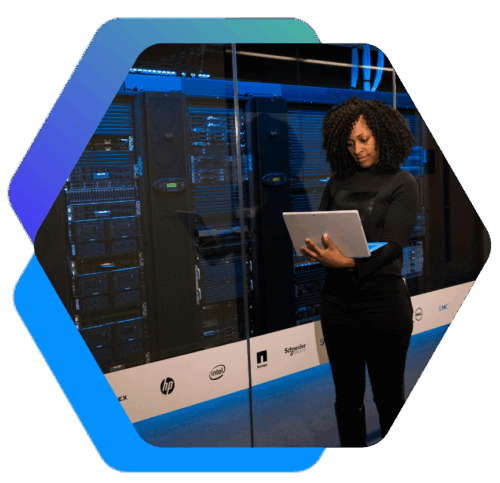UK AI Leadership: How Britain Can Lead the Global AI Race
Tim Flagg leads the UK AI trade body representing hundreds of businesses from AWS to SMEs across every sector.
A recent conversation between Tim and our CEO, Felix Mitchell, revealed both the enormous opportunity ahead for the UK and the significant implementation challenges that could derail it.
 "We're at this kind of crossroads in the geopolitical space," Tim explained. "You see what the US is doing and they're deregulating and trying to really allow tech to come to the fore. But then you've also got the EU and they've got the EU AI Act. And so there's this kind of tension between deregulation versus regulation."
"We're at this kind of crossroads in the geopolitical space," Tim explained. "You see what the US is doing and they're deregulating and trying to really allow tech to come to the fore. But then you've also got the EU and they've got the EU AI Act. And so there's this kind of tension between deregulation versus regulation."
Britain sits uniquely positioned between these two extremes. Tech giants are pouring billions into British AI. We've got world-class universities churning out genuine talent. Our time zone works for both coasts of America and the whole of Europe. We've got this deep history of being first to market with technology that changes everything.
And for once, our politicians are talking like they get it.
The question Felix and Tim kept circling back to is whether that's substance or just another round of Westminster theatre.
A Uniquely British Approach
What makes this moment different is the UK's potential to forge its own path. As Tim put it: "There's a unique British way of being able to look at AI. And it's a very responsible sort of AI."
We've spent centuries building systems based on fairness and transparency. British law is still the global gold standard. Our education system - for all its faults - is still world-class. We've got soft power that money can't buy.
That heritage matters because AI isn't just another tech trend. We're talking about technology that's fundamentally reshaping how societies function, how economies work, how power itself gets distributed. This is geopolitical. This is about who writes the rules for the next 50 years.
The Labour government has recognised that this is hugely important. They launched the AI Opportunities Action Plan in January - bold, ambitious, all the right words. Tim noted the shift: "The new Secretary of State Secretary Kendall, coming into the role, she's very passionate about skills and she's very passionate about how to bring in everybody. So the technology doesn't just benefit the Southeast, it's actually able to really help all people across all communities across the UK."
Regional Power as the Secret Weapon
 One of the most compelling parts of the conversation focused on regional development. Tim shared a brilliant example from Liverpool, where Mayor Steve Rotherham has been making genuine progress.
One of the most compelling parts of the conversation focused on regional development. Tim shared a brilliant example from Liverpool, where Mayor Steve Rotherham has been making genuine progress.
"He sits across six individual councils and when he was thinking about what is the bedrock for being able to make technological advances in that region, he looked at the connectivity, the broadband, and he's actually been able to link up to create an incredible fibre network right across all those six councils using his mayoral power."
It's unglamorous work - fibre networks aren't sexy. But it's essential. And it only happened because Rotherham had the devolved authority to make it happen across multiple councils.
Liverpool's now building on that foundation. They've got undersea cables linking them to America and Ireland. They've got serious research facilities and universities. They've got businesses that are switched on. And critically, they've just hired Tiffany St. James as Chief AI Officer.
"If you compare it to a couple of hundred years ago when that part of the world was going through the first industrial revolution," Tim explained, "it's not looms, it's not railways, it's not dockyards now that's powering it - it's AI."
Felix pushed on why regional mayors might succeed where central government struggles. Tim's answer was pragmatic: trying to transform the entire UK at once is "kind of like trying to boil the ocean." Regional mayors can move faster, experiment more freely, and create playbooks that can be shared across other regions.
The Implementation Gap
The real challenge isn't understanding that AI matters - it's actually implementing it. Both Felix and Tim see this playing out constantly.
"CEOs will often jump to the solution without thinking about the problem," Tim observed. "They will have read about AI in the latest McKinsey report. They'll then go to their leadership team and say we have to use AI... Those things are good in themselves, but they're putting a solution before the problem."
Most organisations still don't have a clue how to implement any of this. They bolt on ChatGPT or Copilot, wonder why nothing changes, and then quietly give up.
It's the same problem whether you're running a 500-person business or trying to transform the NHS. You need people who understand both the technology and how organisations actually work. You need to frame the right problems before jumping to solutions. You need patience for the messy reality of change.
 Government is struggling with exactly this. They're trying to drive adoption across hundreds of different departments, thousands of public sector organisations, dozens of regional authorities - all with different priorities, different levels of understanding, different legacy systems.
Government is struggling with exactly this. They're trying to drive adoption across hundreds of different departments, thousands of public sector organisations, dozens of regional authorities - all with different priorities, different levels of understanding, different legacy systems.
The bottlenecks aren't technical, they're human. Recruitment and change adoption, specifically. Government can't fill technical roles. They're losing people to the private sector constantly.
Building AI Literacy
The solution isn't another government initiative or investment fund. As Tim emphasised: "The key to unlocking all of this is that everyday AI literacy, the confidence to be able to play around with a ChatGPT or Gemini and just the confidence to use it."
Not coding skills necessarily, but the confidence to experiment, the curiosity to understand how these tools work, the judgement to know when to use them and when not to.
The organisations that did proper digital transformation 10-15 years ago aren't fazed by AI. They've got agile teams, they test and learn, they're curious. For them, it's just another technology.
The ones who skipped that step are drowning.
Tim's vision involves collaboration across multiple sectors: "Businesses have a critical role. The large businesses, of course, they'll have programmes... Our role is bringing everyone together to be able to say, okay, well, what are the consistent skills that all businesses need?"
That needs to start in schools. It needs businesses to take responsibility for upskilling their people. It needs regional mayors to work with local employers and universities to create pathways that actually make sense.
And it needs politicians to stop announcing things and start obsessing over delivery.
The Window Is Closing
Felix was characteristically direct about the timeline: we've got maybe 12-18 months before the window closes. Before other countries figure out what we should be doing and do it better. Before the infrastructure gets built elsewhere. Before the talent goes to where the opportunities actually are.
The UK could genuinely become a global AI leader. We've got the assets. We've got the opportunity.
We just need to stop talking about it and actually do the work.
Listen to the full conversation with Tim Flagg on the We Need to Talk About AI podcast.
Share this
